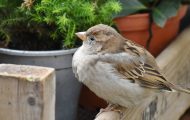So you’re all set to dive to your pool when you see a flock of ducks gliding through the waters.
Birds are a big problem, especially in swimming pools. Their smelly and acid-filled droppings will make a big mess on the water. Also, birds can bring a slew of diseases that pose a big threat to your family’s health. This is why you should know how to keep birds away from swimming pool to prevent communicable diseases and filth that will ruin the summer fun.
In this post, I will share my tried and tested methods to drive away the pesky birds away from your pool.
Why do birds like swimming pools?
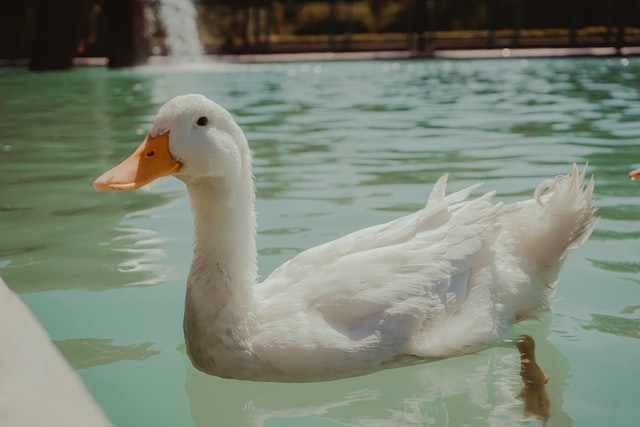
Some bird species are naturally attracted to water features. The likes of warblers, buntings, orioles, ducks, and geese all love water. So if you have a pool and the only property in the neighborhood to have one, you shouldn’t be surprised if the birds will throw their own pool party.
Also, birds will not hesitate to drink from your pool, even if it has chlorine. And if you eat by the poolside, the smell of food will surely invite scavengers and hungry birds to perch.
Moreover, birds prefer to defecate on water features. This is because it’s harder for predators to track the odor of their droppings on the water. It’s a defense mechanism, which will take its toll on your family pool.
Despite this, there are ways to repel birds from pooping or diving into your pool. Below, I shared my proven methods that you can also try on your pool. I also discussed additional tips to save your pool from gross bird droppings.
How to keep birds away from swimming pool?
Are you tired of having to guard your pool all day long against birds? If so, you should use these tactics instead:
🦅Install a netting cover
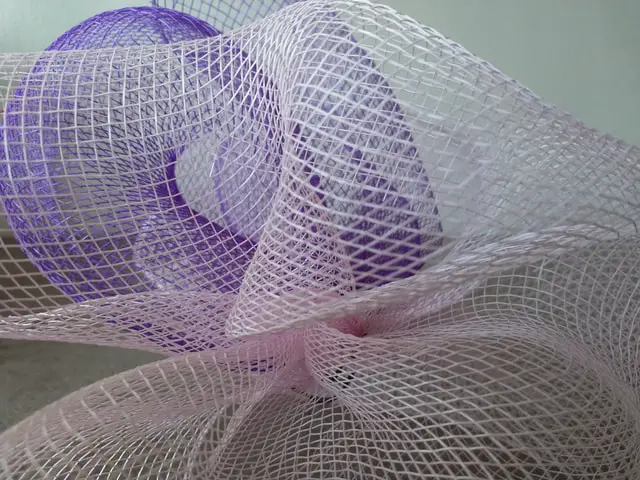
The most effective way to prevent birds from getting into your pool is by installing a net cover overhead. This will also keep your yard’s water feature away from the bird’s view. Aside from that, the netting can trap droppings before it gets into the water.
Just make sure that you use netting with thick patterns. This way, the droppings won’t drip into the pool. I also recommend a durable material that has excellent UV resistance.
Aside from preventing birds, a net cover on top of the pool area can help keep the water clean. It will block falling leaves and debris so that maintenance will be much easier in the long run.
🦅Remove food sources
It’s also important to remove any food sources attracting the birds to go near your pool. For example, never leave food leftovers on poolside tables if your area is notorious for birds perching.
Also, it’s important to install bird feeders away from your pool. Otherwise, the birds will use your pool as their water fountain.
If possible, you should position bird feeders as far away as possible if you don’t want to remove them entirely.
Aside from that, it will be a big help to keep your grass lawn well kept. It’s best to keep the grass thin and to remove fruit-bearing plants near the pool. The fruits of these plants are attractive food sources for birds.
🦅Use visual scares
You’ll never go wrong when it comes to visual scares. You can use fake owl status, scare tapes, shiny spirals, and even mirrors that will blind the birds’ line of vision as they try to go near the pool.
Take note that visual scares like own decoys must be moved in different positions regularly. Birds are smart, and they will soon learn if something is harmless or not. So if you don’t move your visual scares, you shouldn’t be surprised if you’ll find a bird perched right on top of it. A good one for swimming pools and ponds is the Bird-X Gator Guard® Floating Alligator Head Bird Scare with Reflective Eyes.
One of my favorite visual scares for pools is Bird Barrier’s Daddi Long Legs. I used to have this on my fishing boat, but I also realized that this deterrent is effective in pool areas. Basically, it has a spindle where the legs are connected. It’s also designed to move even on the slightest wind.
Overall, it’s decorative and effective in scaring birds that will try to get near a pool. For your family pool, I mounted this on a pole where our net cover is attached. You can also use multiple units if you have a large pool.
🦅Play distress sounds
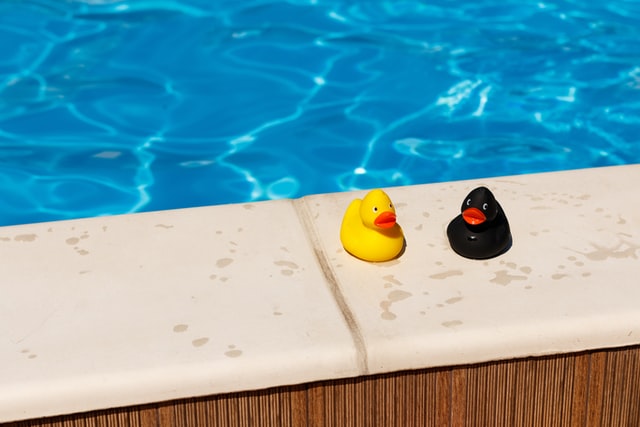
Birds use various sounds to communicate and detect a predator. You can use the same thing to drive them out of your backyard pool. You only need to play predator sounds near your poolside, but make sure that it’s suitable for the specific bird species you want to get rid of.
Other homeowners who live on large farms use sonic cannons. However, these are noisy and not a passive solution.
Also, based on my experience, not all birds will be deterred by ultrasonic repellents. While you can still use it as an added barrier, you should pair the device with other methods I discussed here.
🦅Grow hedges to block geese and ducks
If geese and ducks are your major problems, building a hedge around your pool will be an effective solution. It will block the fowl’s path into your pool, but make sure that it’s high enough to prevent them from overcoming the barrier.
If you don’t want the maintenance requirements of hedges, a fence made of crisscrossed fishing lines will work. Just make sure that the line has color, so other people around won’t accidentally trip on it.
Others use electrical fences, but I don’t recommend this for two reasons. First, you may unintentionally kill a protected species, and second, live wires aren’t the best thing to have near a water feature.
🦅Leave pool toys on the water
One trick that a friend taught me is to leave inflatables and other toys in the pool that resemble a predator. I personally have the Intex Peacock Inflatable Island. It’s large and has bright colors with eye-like patterns that will scare birds. Of course, you should pair this with other methods here, as pool toys are just added visual scares.
You can also use inflatable owl decoys in the pool. I recommend bright-colored ones, and if you can, look for a pool toy with a reflective material. This will disorient a bird that will try to approach the pool.
🦅Make perching spots uncomfortable
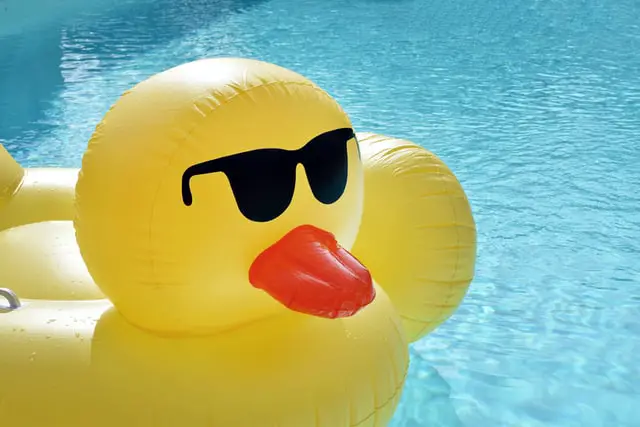
Some birds will not directly approach your pool from above. Others will perch on nearby structures before hovering and dropping the bomb on the water.
I recommend installing bird spikes on your roof ridge, eaves, chimney rim, and so on. You can also put some along your fences if this is where birds tend to hang out.
🦅Provide the birds an alternative spot
Another way to keep the birds out of your pool is to give them their own place. You can set up a bird feeder and water fountain on the other side of your property, away from the pool. However, this will only work if you have a large property with enough distance between the pool and the feeder.
Also, you can install another water feature where the birds can freely drink and bathe. However, this can be tricky as water features may attract more birds than you intended to.
How to clean a pool after finding a dead bird
If you discover a dead bird in your pool, it’s important to disinfect the water feature properly. The bird may drown while trying to drink or that a predator dropped them from the sky. Whatever it is, here’s what you need to do:
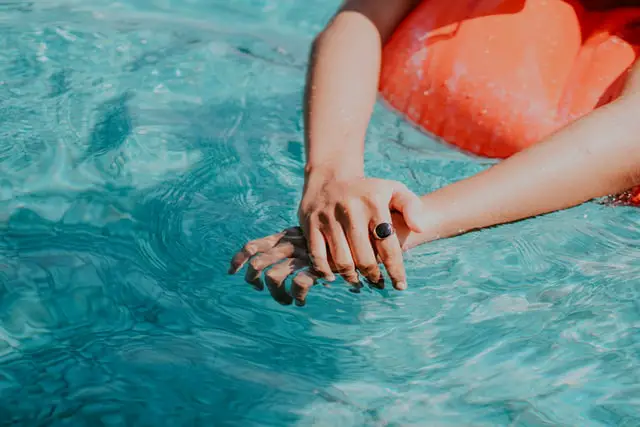
- Tell everyone not to swim. It’s important to inform your family that you’ve found a dead bird on the pool. Even if it’s just a small bird, if it’s soaked on the water for days, it would spread infectious bacteria.
- Remove the dead bird. Start cleaning by scooping the dead bird out of the water. You can use a net with a pole instead of soaking yourself into the pool. Make sure that there are no debris left. And while you’re there, you should also scoop out other dirt you’ll see.
- Dispose of the dead bird. If it’s a typical bird species, you can place it in a sealed trash bag and into the bin. However, if what you discovered is a protected species, it’s best to call your local animal control center. They may need to ID the specific bird for documentation and tracking purposes.
- Raise the chlorine level. The next crucial step is to increase the chlorine level of the pool. Take note that no one should be on the pool while you’re doing this as excessive chlorine is dangerous to humans and animals. Overall, you need to keep the chlorine level at 3 ppm with a pH level of 7.5 and temperature of 25C or more. Do this for about 30 minutes to kill the germs.
- Let the filtration run. While the chlorine level of the pool is raised, you should ensure that the filtration system is up and running.
- Lower the chlorine level. After 30 minutes, you can lower the chlorine level of the pool while keeping the filtration system running. This should be enough to remove any germs that the dead bird left behind. You should wait for four hours after this before swimming and once the chlorine level is at 1 ppm.
Frequently Asked Questions
Q: Are birds attracted to swimming pools?
A: Many birds are attracted to water features. Some like floating on the pool, drinking, or pooping on it. This is to hide their scent from potential predators that may track their droppings in the wild. This is more so if flocks of birds frequent your area.
Q: Will birds die from drinking pool water?
A: Yes, the chlorine in swimming pools can be potentially deadly to wild animals, especially in high concentrations. Like humans, birds aren’t designed to ingest chlorine. Even if birds have strong stomach acids, they are no match to strong chlorine. This is why you should discourage birds from drinking in your pool, especially if your area is home to endangered and threatened species.
Q: Is it safe to swim in a pool with a dead bird?
A: You should never swim in a pool where a dead bird was found. The bacteria and viruses from the dead bird can be transferred to humans and lead to various health problems. Even if there’s chlorine in the water, it’s not a guarantee that all the germs will be killed.
Q: Do birds drown in water?
A: While they are great flyers, birds can still drown in water. Birds aren’t programmed to swim, and once their feathers get soaked, it will be hard for them to regain their flight. It only takes a few minutes for a bird to drown, even big ones.
Q: Why do birds bathe?
A: You’ll sometimes see birds bathing in your pool. This is just their way of maintaining their feathers and removing dirt. It keeps their feathers dirt-free for a better flight. This is completely normal and just part of their survival process.
Q: Why do birds keep drowning in my pool?
A: It’s quite common for birds to die in water features. If your swimming pool is having more bird deaths than usual, it might be the only water feature in the area. Also, you probably don’t use pool covers when the pool isn’t in use. You should also consider the possibility that your area is frequented by birds of prey that may accidentally drop their catch into your pool.
Final words
Knowing how to keep birds away from swimming pool will save you from nasty droppings and even dead fowls. However, you should only use humane methods instead of killing and physically harming the birds. In the end, it’s easier to scare birds than dispose of their dead bodies. Above all, you should remember that some bird species are protected under federal law.


